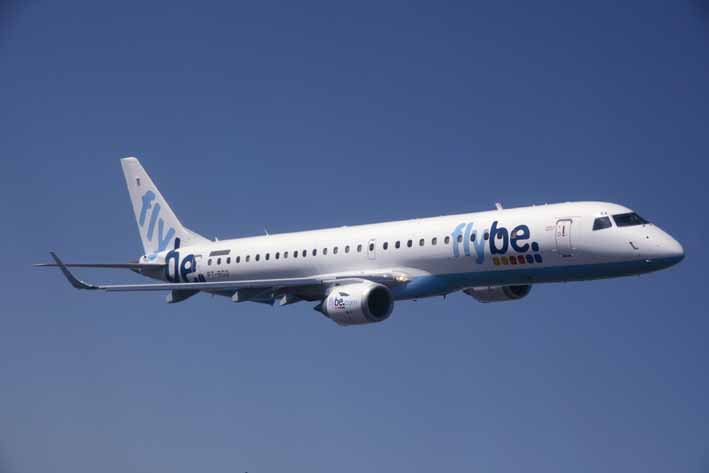Ailing UK regional airline Flybe has finally declared insolvency after failing to secure a crucial £100m loan from the British government, with the carrier blaming the impact of COVID19 for tipping it into insolvency.
In a statement the defunct carrier said, “all flights operated by Flybe have been cancelled with immediate effect. [The] airline has been unable to overcome significant funding challenges to its business. This has been compounded by the outbreak of coronavirus which in the last few days has resulted in a significant impact on demand.”
Stobart Group, which last year invested in Flybe as part of the Connect Airways consortium, comprised of hedge fund, Cyrus Capital (40%), Virgin Atlantic (30%) with it holding the remaining 30%, issued a statement which said that it was, “deeply disappointed”, over the insolvency.
Connect Airways had invested more than £135m to keep the airline flying for an extra year. This amount includes approximately £25m of the £30m committed in January 2020.
“Flybe had shown promising signs of a turnaround despite the delay to receiving merger control clearance from the European Commission for its acquisition. However, despite the best efforts of all, not least the Flybe people, the impact of COVID-19 on Flybe's trading means that the consortium can no longer commit to continued financial support,” Stobart Group said in a statement.
Stobart’s statement also pointed to the negative impact Flybe’s collapse would have on London Southend Airport, as the now insolvent airline was planning to operate ten routes from the airport from Spring of this year.
The chief executive of the UK Airport Operators Association Karen Dee also warned of the impact that Flybe’s collapse would have on regional airports, saying that the firm played, “a critical and unique role in the UK aviation system”.
Dee said that Flybe supported the development of the regions by providing essential connectivity that no other airline or other mode of transport offered and was critical of the British government with regard to the airline’s failure.
“There was a crucial role for Government to safeguard vital domestic connectivity,” she said. “The announcements in January of a review into Air Passenger Duty and Regional Air Connectivity were seen as a sign that the Government understood the vital importance of regional connectivity and the damaging impact of APD. It is extremely disappointing that just a few weeks on, the promised urgent action has not led to a workable solution and that the reviews have made no progress.
The Government now needs to urgently step up to the plate to help UK regions recover from this major blow.”
The UK government issued a statement saying that Flybe's financial difficulties were longstanding and well documented and pre-dated the outbreak of COVID-19. “We are working closely with industry to minimise any disruption to routes operated by Flybe, including by looking urgently at how routes not already covered by other airlines can be re-established by the industry.
“Through the reviews of regional connectivity and Airport Passenger Duty we have announced, we will bring forward recommendations to help ensure that the whole of the UK has the connections in place that people rely on,” said the statement.
Stobart’s fellow Connect consortium member Virgin Atlantic, also issued a statement, with its spokesperson, saying the firm was unhappy over Flybe’s failure. “Sadly, despite the efforts of all involved to turn the airline around, not least the people of Flybe, the impact of COVID-19 on Flybe’s trading means that the consortium can no longer commit to continued financial support.”
Flybe’s financial situation was already precarious and the coronavirus outbreak was the final straw for the ailing carrier. All airlines are suffering and will continue to suffer from the impact of the virus as it spread around the world, but the weaker carriers will start to fail as the lack of summer travel income begins to bite into the bottom line.
Norwegian for example, which has done much to restore its financial position over the past year by cutting costs, selling assets and raising new debt, will find it difficult. Indeed, today the carrier announced the cancellation of 22 flights between Europe and the US due to reduced demand, and it has withdrawn its 2020 guidance stating that “at this stage, it is too early to assess the full impact [of COVID-19) on our business”.
It is too soon to tell the final impact of the virus on the airline industry as a whole but the IATA scenarios out today give an indication of the severity. IATA now sees 2020 global revenue losses for the passenger business of between $63 billion (in a scenario where COVID-19 is contained in current markets with over 100 cases as of 2 March) and $113 billion (in a scenario with a broader spreading of COVID-19).
Airline share prices are being impacted and some carriers will need to take more dramatic measures that cutting capacity to weather this storm, specifically negotiating with suppliers for payment holidays, etc. A better picture of the impact will be seen after the Easter holiday period and into the summer since bookings are already markedly down.

